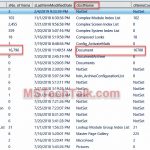I have seen multiple posts on different forums to get details of list columns (like field type) for all SharePoint Lists or any specific list. I also uploaded script to Technet document gallery . This PowerShell script will show the fields defined in list Views. But with a little modification in code you can get details of all fields associated with SharePoint List.
There are two functions in attached PowerShell script:
GetSPFieldDetailsForAllLists:
This function takes one parameter (Site URL), and will print all fields in SharePoint site associated with list views.
function GetSPFieldDetailsForAllLists($SiteCollectionURL)
{
$site = new-object Microsoft.SharePoint.SPSite($SiteCollectionURL) #Change site URL#
$web = $site.openweb()
foreach ($list in $web.Lists) #Get all list in web
{
foreach ($view in $list.Views) #Get all views in lists
{
$spView = $web.GetViewFromUrl($view.Url) #Grab views URL
Write-Host "List Name: " $list.Title ##Print List title
Write-Host "------------------------------------------------------"
Write-Host "Field Name | Field Title " -ForegroundColor DarkGreen
Write-Host "------------------------------------------------------"
foreach ($spField in $spView.ViewFields) #Loop through all view URLs and get Fields (columns)
{
foreach ($field in $list.Fields) #Get all fields in lists
{
if($spField -eq $field.Title) #if field in lists equals field in views
{
Write-Host $spField " | " $field.Type -ForegroundColor Green #Write out each field (column)
}
}
}
Write-Host "------------------------------------------------------"
Write-Host " "
}
}
$web.Dispose()
$site.Dispose()
}
Function Call: Function can be called as GetSPFieldDetailsForAllLists http://<siteURL>
GetSPFieldDetailsForList:
This function takes two parameter (Site URL & List name). It’s functionality is same as of GetSPFieldDetailsForAllLists but it will print field details of only single list which is passed as parameter.
function GetSPFieldDetailsForList($SiteCollectionURL, $listName)
{
$site = new-object Microsoft.SharePoint.SPSite($SiteCollectionURL) #Change site URL#
$web = $site.openweb()
$list = $web.Lists[$listName] #Get Field Details for specified list
foreach ($view in $list.Views) #Get all views in lists
{
$spView = $web.GetViewFromUrl($view.Url) #Grab views URL
Write-Host "List Name: " $list.Title ##Print List title
Write-Host "------------------------------------------------------"
Write-Host "Field Name | Field Title "
Write-Host "------------------------------------------------------"
foreach ($spField in $spView.ViewFields) #Loop through all view URLs and get Fields (columns)
{
foreach ($field in $list.Fields) #Get all fields in lists
{
if($spField -eq $field.Title) #if field in lists equals field in views
{
Write-Host $spField " | " $field.Type -ForegroundColor Green #Write out each field (column)
}
}
}
Write-Host "------------------------------------------------------"
Write-Host " "
}
$web.Dispose()
$site.Dispose()
}
Function Call: Function can be called as GetSPFieldDetailsForList http://<siteURL> <List Name>
Get Details of all fields associated with SharePoint List:
With a little modification in above code, you can get details of all fields associated with List. In above code snippet I have used fields for List view only. For fetching all list fields, you will need to do below modification.
$site = new-object Microsoft.SharePoint.SPSite("http://<Site URL>") #Change site URL#
$web = $site.openweb()
$list = $web.Lists["<List Name>"] #Get Field Details for specified list
Write-Host "List Name: " $list.Title ##Print List title
Write-Host "------------------------------------------------------"
Write-Host "Field Name | Field Title "
Write-Host "------------------------------------------------------"
foreach ($field in $list.Fields) #Get all views in lists
{
Write-Host $field.Title " | " $field.Type -ForegroundColor Green #Write out each field (column)
}
Write-Host "------------------------------------------------------"
Write-Host " "
$web.Dispose()
$site.Dispose()










No Comments